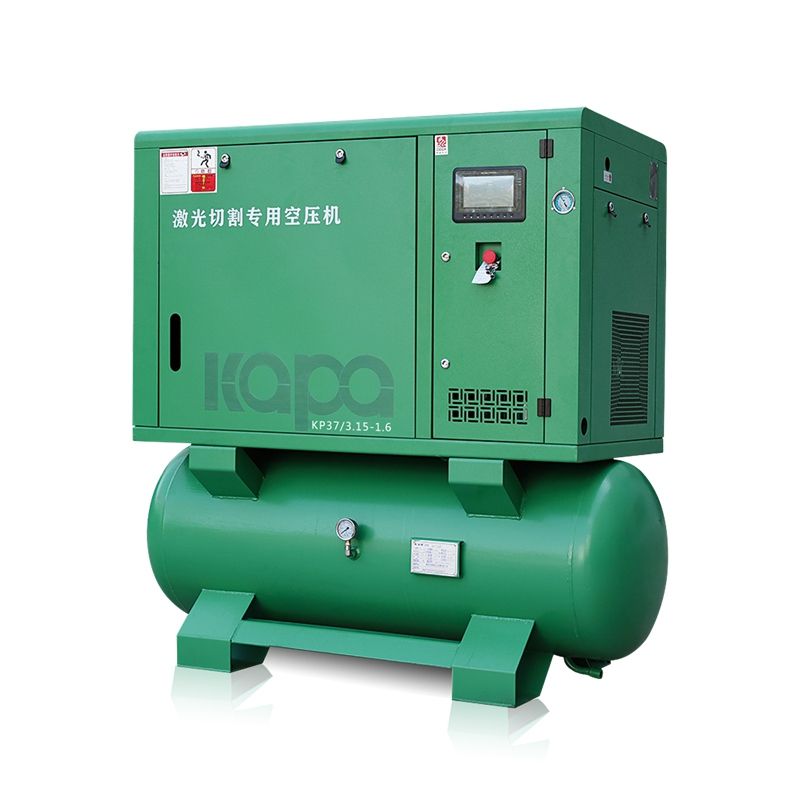Choosing the Right 4-in-1 Integrated Air Compressor for Laser Cutter
Investing in a 4-in-1 integrated air compressor for your laser cutter is crucial for optimal performance and efficiency. With a myriad of options available in the market, choosing the right one can be overwhelming. However, with the right knowledge and understanding of your requirements, you can make an informed decision. In this guide, we'll delve into the key factors to consider when selecting a 4-in-1 integrated air compressor for your laser cutter.

Understanding Your Needs
Before diving into the selection process, it's essential to assess your specific needs and requirements. Consider factors such as the size and power of your laser cutter, the frequency of usage, available space, and your budget. Understanding these aspects will help narrow down your options and ensure you choose a compressor that meets your unique needs.
Assessing Compressor Capacity
The capacity of the air compressor plays a crucial role in its performance. For a laser cutter, opt for a compressor with sufficient capacity to provide a steady and consistent airflow. Ensure that the compressor can deliver the required pressure and volume of air to support your laser cutting operations effectively.
Evaluating Power Requirements
Different laser cutters have varying power requirements, and it's essential to choose a compressor that can meet these demands. Check the power specifications of your laser cutter and select a compressor with compatible power output. Additionally, consider factors such as voltage compatibility and power consumption to ensure seamless integration with your equipment.
Factors to Consider
When choosing a 4-in-1 integrated air compressor for your laser cutter, several key factors should influence your decision. Let's explore these factors in detail:
Quality and Reliability
Invest in a compressor from a reputable manufacturer known for producing high-quality and reliable Screw Compressor. Check customer reviews, testimonials, and product ratings to gauge the reliability of the compressor. Opting for a trusted brand ensures durability and longevity, minimizing the risk of breakdowns and downtime.
Noise Level
Consider the noise level of the compressor, especially if your laser cutting setup is located in a shared or noise-sensitive environment. Look for compressors with low noise emissions or built-in noise-reduction features to minimize disruptions and create a conducive working environment.
Size and Portability
Evaluate the size and portability of the compressor, particularly if space is limited or if you need to move the equipment frequently. Choose a compact and lightweight compressor that can be easily transported or positioned in tight spaces without compromising performance.
Maintenance Requirements
Consider the maintenance requirements of the compressor and opt for a model that is easy to maintain and service. Look for features such as accessible filters, oil-free operation, and user-friendly controls to streamline maintenance tasks and minimize downtime.
Additional Features
Explore additional features and capabilities offered by the compressor, such as built-in air dryers, moisture separators, and automatic shut-off functions. These features can enhance the performance and efficiency of the compressor while providing added convenience and peace of mind.
FAQs
1. What is the ideal capacity for a compressor for laser cutting applications?
The ideal capacity depends on factors such as the size and power of your laser cutter. It's recommended to choose a compressor with sufficient capacity to meet the airflow requirements of your equipment.
2. Are oil-free compressors suitable for laser cutting applications?
Yes, oil-free compressors are suitable for laser cutting applications as they eliminate the risk of oil contamination in the air supply, ensuring clean and high-quality cuts.
3. How important is it to consider noise levels when selecting a compressor?
Noise levels are crucial, especially in shared or noise-sensitive environments. Opting for a compressor with low noise emissions helps create a conducive working environment and minimizes disruptions.
4. Can I use a portable compressor for my laser cutter?
Yes, you can use a portable compressor for your laser cutter, provided it meets the airflow and power requirements of your equipment. Ensure compatibility and consider factors such as size and weight for ease of transportation.
5. What maintenance tasks are involved in caring for a compressor?
Maintenance tasks may include regular filter replacement, drain valve inspection, and lubrication (for oil-lubricated models). Refer to the manufacturer's guidelines for specific maintenance requirements and intervals.
6. Are there any safety considerations to keep in mind when using a compressor with a laser cutter?
Yes, it's essential to follow safety guidelines and precautions outlined by the compressor manufacturer to ensure safe operation. This may include proper ventilation, electrical safety measures, and adherence to recommended operating pressures.
Conclusion
Choosing the right 4-in-1 integrated air compressor for your laser cutter is a crucial decision that can significantly impact performance and efficiency. By considering factors such as capacity, power requirements, quality, and additional features, you can make an informed choice that meets your specific needs. Remember to prioritize reliability, functionality, and user-friendliness to maximize the value of your investment.

评论
发表评论